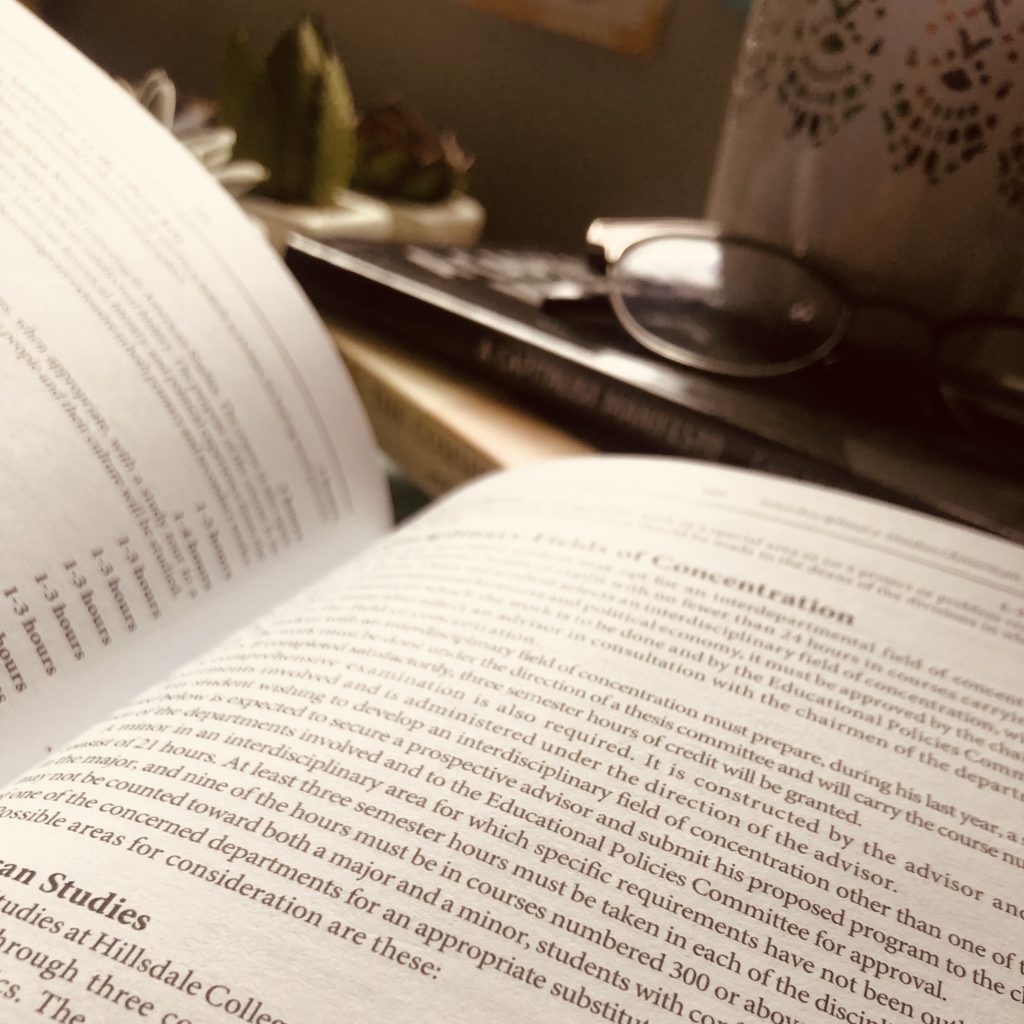
Elizabeth James ’19, said she wasn’t expecting the question Hillsdale College President Larry Arnn asked her as they shook hands on the commencement ceremony stage.
“Are you the one who started all this?”
She was the sole recipient of an international affairs degree last May. Being the only graduate called for the major she created herself, James said the ten steps across that stage were uncomfortable and exciting.
Three years earlier, she began pioneering the first interdisciplinary major in nearly a decade.
“I didn’t want to do anything else,” James said. “My mother would tell me I’m a very stubborn person. Once my mind is set on something, it takes quite a bit to deter me.”
Students may petition to create their own major, so long as they draw from at least three areas of concentration adding up to 36 credits and complete a senior thesis synthesizing them all. Success in getting approval from each relevant department and the Educational Policies Committee is the extra hurdle that distinguishes this major from the existing interdisciplinary ones.
“Those are programs of study that are long-established by the college,” Registrar Douglas McArthur said. “A student doesn’t need to do anything special to declare an American studies major.”
The structure is congruent to the established American studies major, which James suspects started as a student-created interdisciplinary major before becoming an official one.
Regardless, James said students pursuing a major like hers must begin the application process early to utilize this unique Hillsdale opportunity. They need to put together a good recipe.
“Making my major has been the absolute most wild ride of my life,” she said. “I found a purpose in what I was doing.”
James is currently a foreign military sales analyst for the United States Air Force, a position she easily transitioned into after serving as a junior analyst during her summer Washington Hillsdale Internship Program.
“The best way to describe what we do is this: ‘legal arms dealers for the US government,’” she said.
A prerequisite for the job was a major specifically in international relations.
James said there are few progressions from major to career that are so continuous. She said she is grateful to Hillsdale College for taking chances on students they know will be a return on investment.
Other students, like sophomores Jake Umholtz and Mary Greco, said they aim for the same continuity in their international affairs and international politics majors, respectively. Both plan to concentrate in some combination of politics, history, religion, and philosophy.
“I did a lot of research on other institutions: Georgetown and Liberty University, for example,” Umholtz said. “I looked at their programs to see how they structured theirs — how they fit with mine. You don’t want to have your major approved and enter the workforce lacking compared to your peers.”
The Educational Policies Committee exists to ensure students avoid gaps in relevant skills for their field of study. Umholtz said they, in partnership with McArthur, are necessary partners.
“If professors are working in higher education at Hillsdale College — in this environment — they are very knowledgeable and want to help,” Umholtz said.
Some of those professors are the ones from whom students need to get departmental approval anyway.
“Every one of these cases is a one-off,” McArthur said. “I don’t know what would happen if a student brought the same list of courses that they got from a peer who petitioned successfully.”
He said the interdisciplinary major, with multiple students pursuing a similar pathway in each of their petitions, is uncommon. In other words — since the Educational Policies Committee approaches each petition case-by-case, a new question may emerge: Will they accept petitions in the same areas of study from different students?
“I presume we’re on the cusp of seeing more of that,” he said.
Greco aims to take the challenges of beginning this process seriously, taking inspiration from both James and her current mentors. She said Professor of English David Whalen and Associate Professor of Politics Khalil Habib have not only mentored her in coursework selections, but also in manifesting her unique educational goals.
“I have a list of different electives that I could take, but — when I present to the board — I will need to have all those options planned out,” Greco said.
That is another feature of the interdisciplinary major: The student must choose electives early.
Greco believes a major fitted and tailored to her future is essential. Prescribing all coursework from the beginning is no issue.
“It didn’t feel rigid because I was making exactly what I wanted,” James said. “I felt like I had more freedom than anyone else.”
James said the last interdisciplinary major before her was in business fashion, reminiscent of California’s Fashion Institute of Design & Merchandising interdisciplinary programs. As she pioneered in a different direction years later, other students began looking to follow. Hillsdale College may see more interdisciplinary majors in international relations yet — and other subject areas too.

